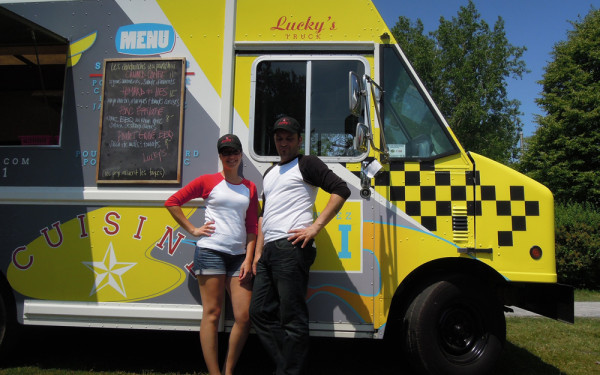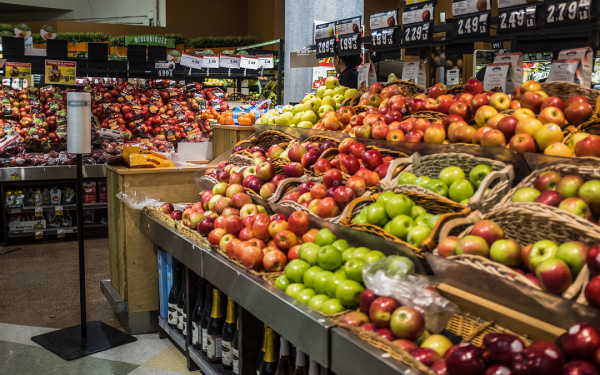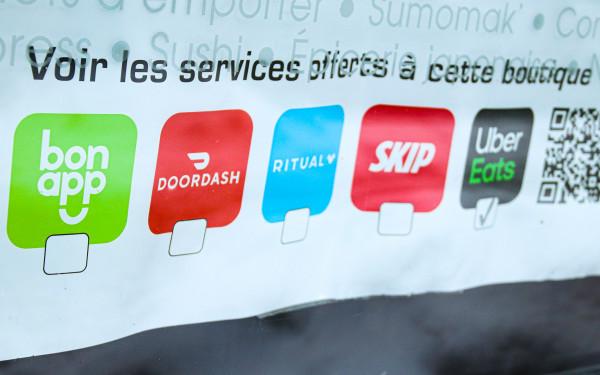Living a self-sufficient lifestyle in remote communities of Quebec
Alex Guérin, founder of Prendre Racines, works on his farmland. Photo Anne-Sophie Jobin and Brittany Romeo-Clarke
Self-sufficiency outside the constraints of the city
The COVID-19 pandemic has led many people to reevaluate their place in society, with some dreaming of abandoning it. But is relying on oneself and one’s close community for food cultivation and life’s other necessities realistic in Quebec, a four-seasons province where most people live in cities?
Meet Shad Ferron, Alex Guérin, and Jean-Nick Trudel, three men who have found a way to live a self-sufficient lifestyle in remote communities of Quebec.
Shad Ferron
Ferron lives in Yamachiche, a village in Mauricie, approximately 30 minutes away from Trois-Rivières. He makes a living from agriculture and dairy production, while being a craftsman and a public entertainer.
“I'm independent of electricity, heat, I almost have all my food. I am able to be self-sufficient in general in all life aspects,” said Ferron. “Every morning I have my eggs, my milk, the baker is in the village with some organic and locally made flours, and my vegetables are almost all harvested. They will be dehydrated, frozen and transformed for the winter.”
In other words, whether it is from his own production or his community, he is always able to find what he needs. Ferron produces most of the food he consumes according to the season, even though it sometimes means he will be eating more frozen food during the winter. Grocery stores could close forever, and he would easily survive.
“If tomorrow you told me, you do not have a job anymore, so no more income, but all your expenses and debts are erased, I could just build my house, add more buildings to my farm, I would feed myself with my animals and vegetables, and for the rest, I would figure it out,” Ferron added.
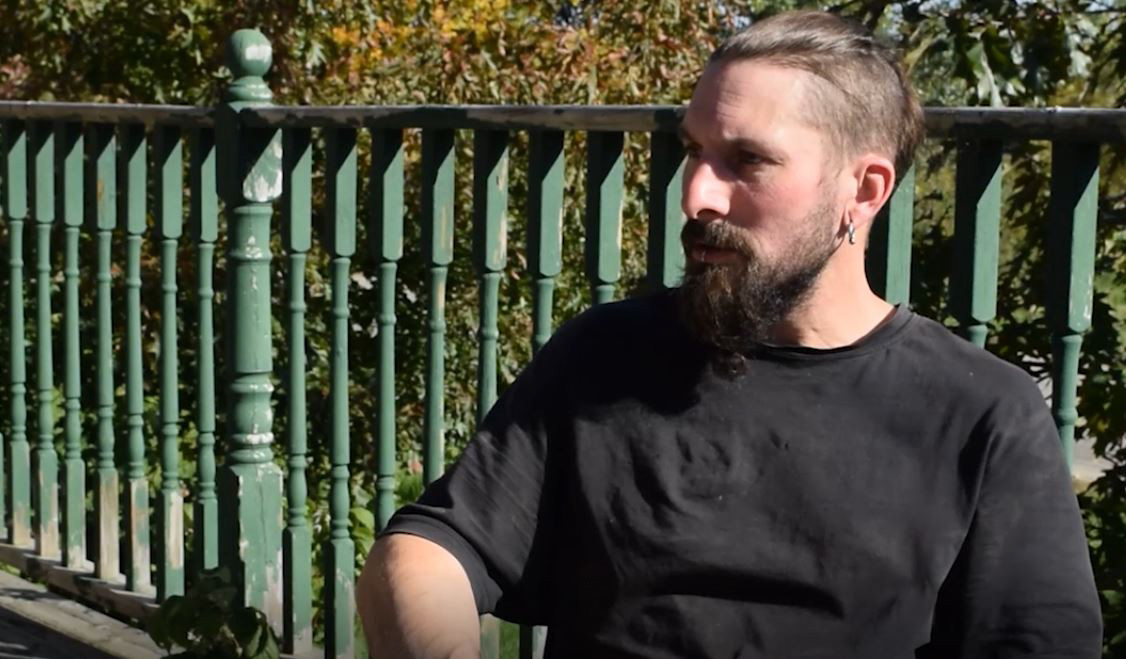
Ferron really believes in a lifestyle where people help each other and exchange services. According to him, this is the best way to create a circular and local economy. This system is comparable to what was the norm for our grandparents and great grandparents, at a time when villagers would simply help each other to make things work.
“Basic needs that are food, shelter, and security are not met anymore. If you today, you put a standard human in the middle of the forest, he will never be able to survive. Some people are not even able to build themselves a shelter, to make a fire, or to find food. They would die in three days,” said Ferron.
This is the main reason why Ferron decided to live his own life, off the grid, independent and self-sufficient. He explained he does not like how the modern world operates where human beings rely on the whole system to survive. He prefers to live his own life and do what he likes at his own pace. He owes much of this independence to his community and network which provides him with products and services that otherwise would not be available to him.
Other members of his network live in nearby villages and also practice self-sufficiency in their own ways. Alex Guérin is one of them: he adapted his self-sufficient lifestyle to his business, Prendre Racine, where clients can find edible products from Quebec forests.
Alex Guérin
“I like to say that it is a tree farm, where I have a breeding ground, trees, shrubs, perennial plants. Basically, I bought land and the objective is to maximize the land and harvest here,” said Guérin.
His mission is to put lesser known Quebec products on the map, like nuts, herbs and spices, while developing a new economy and diversified agriculture. He wants to produce unique products and open up markets that have not yet been exploited in Quebec.
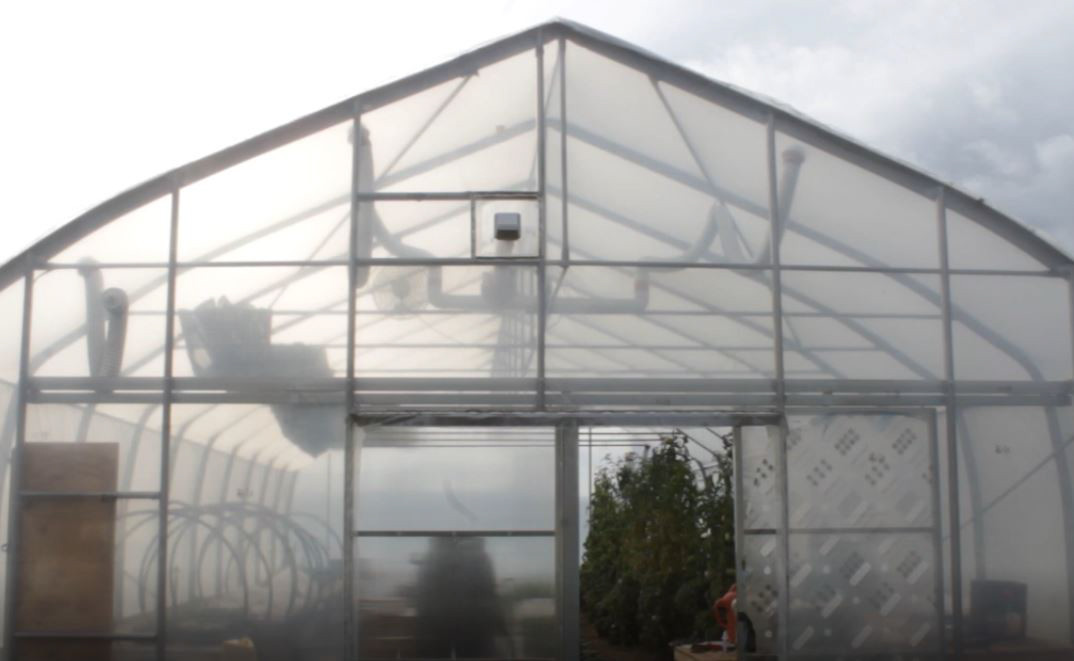
While travelling, Guérin realized that several countries in the world had their own particular spices and herbs based in their geographical location. Quebec is no exception, but consumers ignore the range of local choices available to them and lean toward buying foreign products at lower prices.
If consumers do not get used to incorporating local products into their plates, the process of being economically independent in Quebec becomes more difficult.
“It is very important for our province, we need more artisans in Quebec because this is what will define our landscape,” said Guérin. “Our objective is to feed people here, not to export.”
Guérin and Ferron are both mainly focused on food self-sufficiency since they have farmland and animals. However, they still rely on Hydro-Québec for electricity. On the other hand, a friend and member of their community lives in a self-sufficient home completely off the grid just a few kilometres away.
Jean-Nick Trudel
Jean-Nick Trudel lives in a village called Saint-Élie-de-Caxton. His house is equipped with a photovoltaic system, which is composed of one or more solar panels combined with electrical and mechanical hardware that use energy from the sun to generate electricity. Built under the Earthship principles, this type of house was invented in New Mexico more than 40 years ago. Its goal is to harmonize the house with thermodynamic principles so that the house requires minimal maintenance from its inhabitants. His energy comes from his 16 batteries and the photovoltaic system.
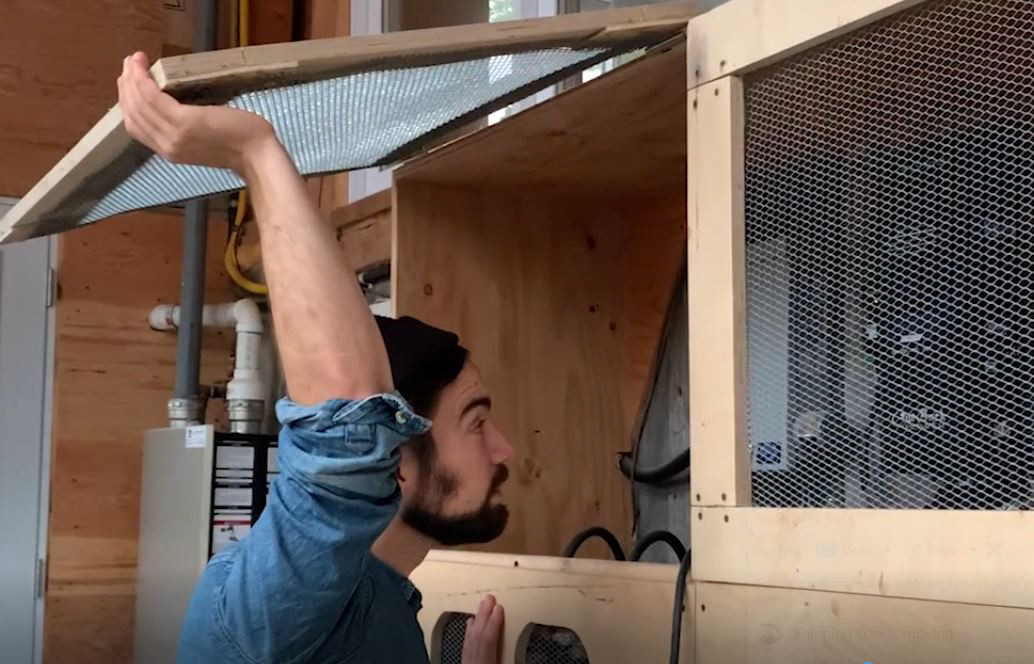
“Today, for example, it’s partially sunny, so the greenhouse's temperature went up to 30 degrees Celsius. It heats up the whole house, and during winter, when it is minus 40 degrees outside but sunny, the greenhouse's temperature can reach 30 degrees and the house is at 20 degrees, so I don't need anything else to heat it up,” said Trudel.
However, Trudel depends on his community to eat. As the director of the Quebec Public Markets Association, he is closely connected to local producers like Ferron and Guérin who provide him with fresh food. His goal is to eat locally grown food all year long. He is what we call a locavore; he does not allow himself to eat strawberries in the winter, or any type of food that is not in season.
These spending habits were the norm not too long ago. The Quebec tradition of receiving an orange for Christmas highlights the past luxury of tropical fruits. Even though we cannot really go back to that lifestyle, the current reality is a luxury that could not be achieved in a self-sufficient Quebec.
“Without being survivalist or crazy about this, it is important to have a simple reflection on how to not be a burden if something happens, and be in the team of those who would help instead of those who would need help,” said Trudel.
He explained that these houses let him have the autonomy and resilience he always dreamed of, adding that it is not an expensive lifestyle. “Anyone who does not have a lot of money could do it. When I started my project, I was earning under the minimum wage.”

According to Ferron, Guérin, and Trudel, the best part about their lifestyle is to only have to count on themselves. They also learn to be autonomous as a group and create collective resilience.
Indeed, the pandemic was a turning point that highlighted Quebec’s dependency on the system and exterior markets for some of our basic needs. Remember the empty shelves in supermarkets, the race for toilet paper, or the rationing of egg cases—all occurrences that have raised questions about the autonomy of Quebec.
“We have six months coming up where greens will be harvested and where we will have to import products. So what should we do to feed ourselves, but feed everyone as well?” asked Trudel.
In any case, Quebecers have made their desire to encourage our local economy clear over the past year. Premier François Legault even promised it: he wants to bring Quebec towards greater food autonomy. Things are moving forward. With that said, several issues make this promise difficult, because some of our needs make us dependent on the rest of the world. There is something to be done if everyone is helping out.

